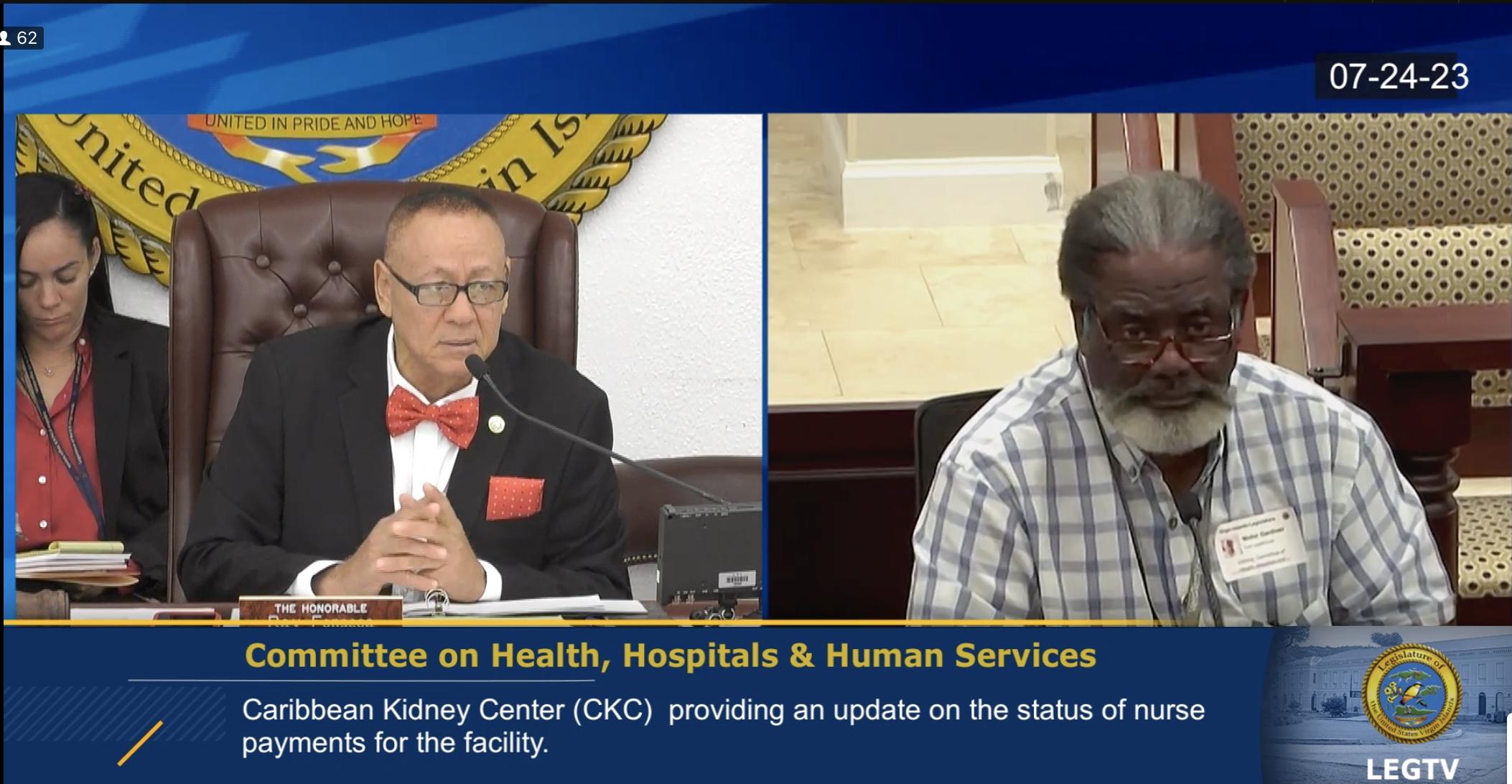
Every few days, roughly 250 Virgin Islanders sit down for a very uncomfortable couple of hours. Their blood is slowly removed, filtered of impurities, and pumped back into their body. Without this treatment, an agonizing death is all but assured.
Dialysis is vital for these people suffering from kidney failure but it’s not a money maker for the clinics providing the service. And as much as these medical professionals are dedicated to keeping their patients alive, they can’t bleed money forever, they’ve told senators twice in as many months.
On Monday, Walter H. Gardiner, medical director and managing member of HealthQuest, LLC, the parent company of St. Croix’s Caribbean Kidney Center, outlined the compounded problem and potential solution frustratingly out of reach.
As a for-profit company, the Caribbean Kidney Center doesn’t qualify for many federal grants, Gardiner said. The center also didn’t qualify for FEMA disaster relief funds, he said.
“We’re basically functioning on our own dime, so to speak. And if that dime was big enough for us to continue, I wouldn’t be here,” he told the Committee on Health, Hospitals, and Human Services.
The territory reached contract agreements with two nurses’ unions earlier this year and is in talks with two other healthcare worker unions — some of whom have been operating on day-to-day ad hoc contracts since 2010.
While the new contracts were celebrated by committee chairman Sen. Ray Fonseca and others, they also put small, non-government clinics to the test. Gardiner told Fonseca Monday about his dealings with Pafford Emergency Medical Services, an Arkansas-based organizer of nurses and other medical professionals.
“As of May 11, the funding the territory was using to pay Pafford ended. When those funds ended, the Pafford nurses basically were no longer on contract,” he said, explaining he then negotiated his own agreement that put his clinic at a short-term loss while keeping the doors open.
“When I got that first invoice, I knew the short term was now. That’s when I came and requested help,” he said, referring to his plea that the Senate send emergency funds after he was briefly forced to close in June. “I’m keenly aware that that’s not a situation that will repeat itself indefinitely, and hence the reason why I’m here with this concern.”
Gardiner’s agreement with Pafford started May 12. Since then, Pafford has submitted four invoices. These were sent to the Department of Health as required by law, Gardiner said.
“I cannot confirm that Pafford has received any payments to date,” he said. “Through July 8, the amount billed is $260,975.54. This is for four pay periods — an average of $65,243.89 per pay period.”
By the end of July, about half of the $700,000 the Senate allocated to keep the dialysis center afloat will be spent, meaning, by the end of September, Gardiner could be asking for more. The center’s 120 patients depended on the service.
Conducting dialysis is not an automatic procedure. While it’s mostly passive — with the patient often trying to zone out in front of a TV — a registered nurse must always be on hand, as well as technicians. It’s not cheap.
The Kidney Center, with its 120-or-so patients, isn’t the only organization seeking funding.
The Virgin Islands Healthcare Foundation was trying to get its operation up and running before the hurricane season, said Tasnim Khan, a nephrology specialist and the foundation’s medical director. Her 50 or so patients were in dire need.
“Dialysis is now on the brink of deteriorating into a humanitarian crisis,” Khan told the Senate in June.
Fonseca agreed Monday, saying several times it was vital the dialysis centers remained open.
“It’s very urgent and critical care. If they don’t get this, the people will die. The closure of Caribbean Kidney Center would be unconscionable,” Fonseca said. “We have to act with a sense of urgency. There are over 250 residents in the Virgin Islands receiving kidney dialysis treatments.”
A plan to keep the Kidney Center open and financially viable without endless government appropriations to private organizations took off unexpectedly in March.
Out of the blue, officials from Juan F. Luis Hospital reached out to Gardiner about buying the dialysis facility. But after eight interactions, the talks stalled in May. Gardiner said he’d sent a potential price for the facility but declined to say what it was at the hearing. Both sides had agreed to a non-disclosure agreement in early May.
Near the end of the hearing, Fonseca said he’d heard from Juan F. Luis officials who said they wanted to resume talks Wednesday.
“The window for the conclusion of the negotiations for the acquisition of the CKC facilities closes at or about the end of August. At that time, CKC will find itself in the same critical situation that necessitated the June closure. Senators, a definitive solution to this problem must be found,” Gardiner said.





